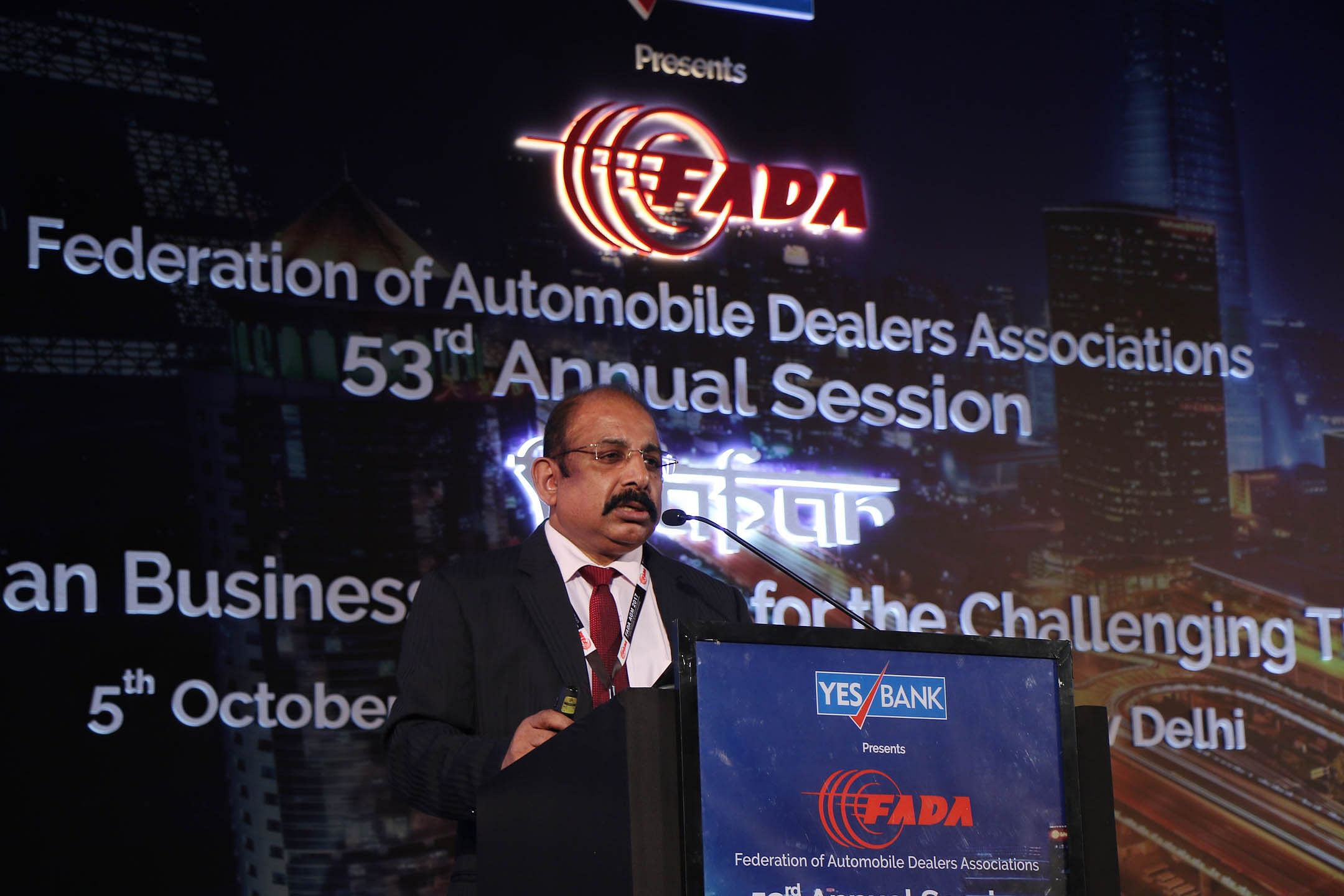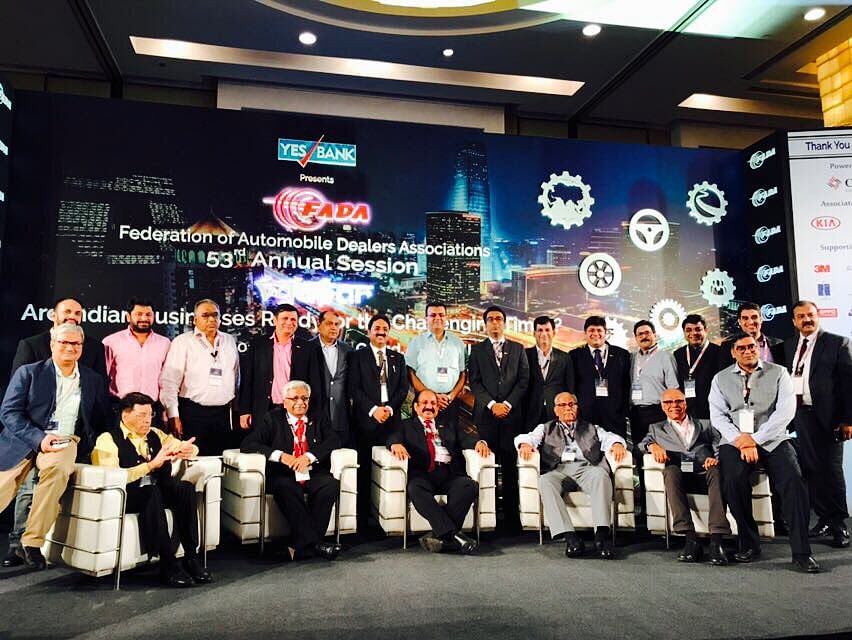FADA AGM sees dealers debate challenges, vouch better service, be future-ready
Having traversed tough times of late and facing new challenges like GST, along with fast-changing consumer preferences in an India that’s also going digital, a 300-strong contingent of dealers thinks of new ways to recharge growth.
The Federation of Automobile Dealers Association (FADA), the apex national body which represents the vehicle dealer fraternity of India, held its annual general meeting in New Delhi on October 5.
The gala event saw the presence of over 300 entrepreneurs from across the country, who have been in the passenger car retail business for decades and have been selling Indians their second most valuable asset after a house. The AGM saw the dealers discuss and debate the many ongoing business challenges and the need to re-invent the business in the coming future.
As is known, the automotive sector contributes close to 7 percent to the GDP of the country, and is one of the biggest revenue sources, FDI attractors and employers in India. Automobile dealerships alone constitute a massive network of over 23,000 showrooms and service centres spread over the entire country – from Kanyakumari to Kibithu – covering the passenger vehicle, two-wheeler and the commercial vehicle segments. More than 2.5 million people work in these small-to-medium scale businesses, with the average workforce size in a Tier 1 outlet ranging between 80-100 personnel, the majority of them being locals.

The Indian auto industry is currently witnessing dynamic change in the form of products, processes, people and policy. According to John K Paul, president, FADA (pictured above), “Changes in laws, taxes, technology, consumer demand as well as to the entire ecosystem are happening quite rapidly and call for business leaders to quickly adapt to the change, and start moulding to the environment.”
At present the mood in the domestic automotive and dealer industry is good albeit both have traversed tortuous terrain, first in the form of the industry sales speedbreaker – the infamous demonetisation drive announced on November 8, 2016 – and then the introduction of GST. The demonetisation exercise, which took the entire country and its populace by surprise, saw overall vehicle sales across segments crash in November and December 2016. It has taken close to nine months for some semblance of recovery to happen.
In the ongoing fiscal, for the April-August 2017 period, overall industry vehicles sales have gone beyond the 10 million mark to 10,261,109 units (+9.26%). While sales of passenger vehicles (1,320,990 / +8.67%) and two-wheelers (8,466,284 / +10.41%) are gradually picking up steam, the CV sector has already seen the green shoots of recovery at 276,147 units (+1.58%). The three-wheeler segment though continues to feel the pressure of slow sales – 197,688 units (-16.26%).
Nonetheless, September, with the onset of the festive season, seems to be the harbinger of better times to come. Initial sales numbers revealed by OEMs across the PV, CV and two-wheeler segments indicate that industry is back firmly on growth road and economic sentiment is somewhat on the rise, which spells good news for the dealer community.

Tackling challenges head-on
For vehicle manufacturers, automobile dealers, many of whom have mastered the art of winning friends and influencing people, are their real-world connect with the consumer.
Nevertheless, in a time of fast-changing consumer preferences and the need for top-notch consumer service at all times and from all personnel at different levels at a dealership and workshop, the dealer fraternity is faced with a multitude of challenges.
And challenges are what men of the armed forces face every day.So it was rather apt that Major General GD Bakshi (retd) delivered a motivational talk at the FADA convention, most of it around the need to develop team spirit, which he said is generally lacking in the country and its people. “Coordination, synchronisation and teamwork are the areas where we need to build our strengths and capabilities in. In an ambiguous situation, the leadership needs to decide and act. Also, what shouldn’t be forgotten is that one has to back subordinates, to march ahead in unison,” said the tough-as-nails army man. It was a lesson which many dealers will take back to their workplace and implement, to their own and the industry’s betterment. As management pundits says, a happy, well-knit team translates into happy customers.
The winds of change in the past year brought along the biggest reformative tax yet – GST – from July 1 and it’s not been exactly a smooth drive. Nikunj Sanghi, former president and director - International Affairs, FADA, said, “We automobile dealers, as entrepreneurs, sometimes find our hands tied down by government policies. The recent revision of the GST cess on automobiles was another sudden reaction, impacting the business on the ground.”
While the government-appointed GST Council has had the time to restructure the automobile cess under GST, revising it upwards from 15 to 25 percent, within just two months of introducing the new tax, one critical issue which still goes unnoticed is the multi-fold tax increment on sale of used cars, which has severely hampered the business of the organised used car market since the past few months. “While we, as FADA, have written to the government, requesting for appointments to discuss the matter, there has been no positive response yet. We are now hoping that there will soon be a resolution as the vehicle manufacturers too are making efforts,” said John Paul.
Another challenge being faced by the dealer fraternity is business sustainability. With a plethora of overhead expenses, discount schemes, land lease rentals and constant push from vehicle manufacturers to invest in newer retail concepts, the general 2.5 percent dealer margin on vehicular sales only helps keep the business afloat and most dealers are not recording any notable rise in their EBIDTA numbers.
Getting digital and future-ready
The world is going digital and the automotive industry is no different. Recent research, a joint effort by FaceBook and Bain & Company, indicates that up to 70 percent (19 million units) of auto sales in the country will be influenced by digital platforms by 2020.
Digital trends have already started to make an impact in India and 40-50 percent of vehicle customers in metro cities are already sure of the specific variant and colour option of their car purchase, even before they walk into a showroom. While all of this will need for constant reinvention of the current retail methodologies, a big question mark hangs over the viability of keeping such establishments running in today's highly connected world.
In a panel discussion on reimagining the automotive dealership business for the next generation, Vinkesh Gulati, honorary secretary, FADA, said, “Yes, digital platforms are going to impact the regular retail scenario. Nevertheless, customers would still like to have a look and feel of the actual product. While this means that dealerships are going to stay, we will quickly have to re-invent ourselves.”
One of the most recent examples of a leap into the future is the introduction of Maruti’s Arena retail format for its existing 2,000-plus showrooms. The company, which commands over 50 percent of the passenger vehicle market, has recognised that the young customer in India is rather discerning and also focuses on the overall experience, rather than just the product. It aims to switch 80 such dealerships to the new format by end-FY2018.
Confirming this perception, advertising guru Prahlad Kakkar, founder, Genesis Film Production, said: “Young buyers of the generation X, as well as their preferences, are changing quite fast. So, it is quite imperative that the sellers also become flexible and adapt to this rush of change. Going forward, a strong answer lies in the use of analytics and leveraging digital and social platforms.”
In the overall analysis, the automobile dealer community seems seized of the need to rejig, reinvent and re-energise itself to chart a new path of growth. As vehicle manufacturers battle in the competitive marketplace to win the buyer's attention and his/her money, dealers too will have to do their bit and put their shoulder to the sales wheel to ensure more footfalls in showrooms and speedy movement of vehicles from the manufacturer to the consumer.
RELATED ARTICLES
Cosmo First diversifies into paint protection film and ceramic coatings
The Aurangabad, Maharashtra-based packaging materials supplier is leveraging its competencies in plastic films and speci...
JSW MG Motor India confident of selling 1,000 M9 electric MPVs in first year
The 5.2-metre-long, seven-seater luxury electric MPV, which will be locally assembled at the Halol plant in Gujarat, wil...
Modern Automotives targets 25% CAGR in forged components by FY2031, diversifies into e-3Ws
The Tier-1 component supplier of forged components such as connecting rods, crankshafts, tie-rods, and fork bridges to l...






 06 Oct 2017
06 Oct 2017
 6533 Views
6533 Views





 Autocar Professional Bureau
Autocar Professional Bureau




